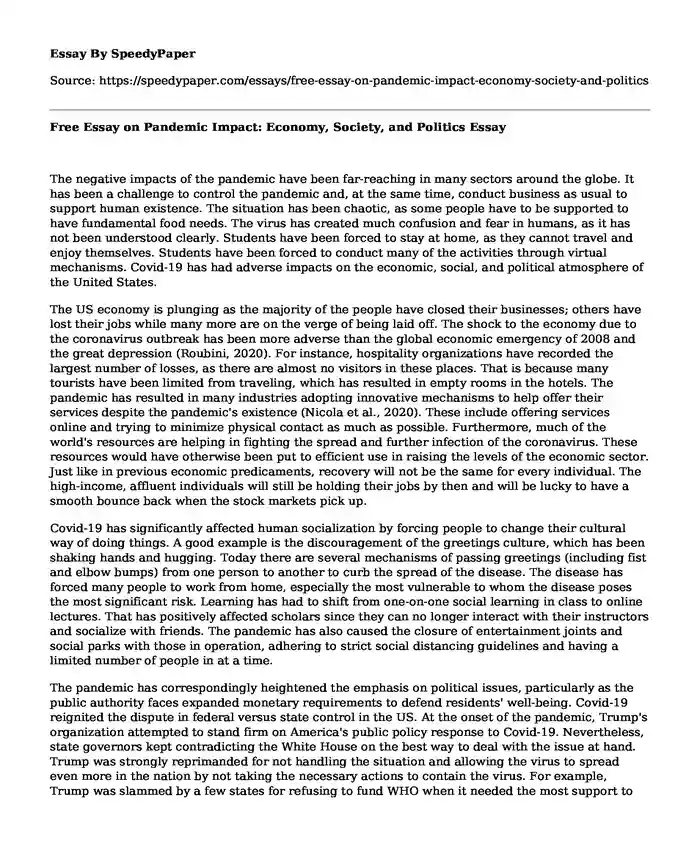The negative impacts of the pandemic have been far-reaching in many sectors around the globe. It has been a challenge to control the pandemic and, at the same time, conduct business as usual to support human existence. The situation has been chaotic, as some people have to be supported to have fundamental food needs. The virus has created much confusion and fear in humans, as it has not been understood clearly. Students have been forced to stay at home, as they cannot travel and enjoy themselves. Students have been forced to conduct many of the activities through virtual mechanisms. Covid-19 has had adverse impacts on the economic, social, and political atmosphere of the United States.
The US economy is plunging as the majority of the people have closed their businesses; others have lost their jobs while many more are on the verge of being laid off. The shock to the economy due to the coronavirus outbreak has been more adverse than the global economic emergency of 2008 and the great depression (Roubini, 2020). For instance, hospitality organizations have recorded the largest number of losses, as there are almost no visitors in these places. That is because many tourists have been limited from traveling, which has resulted in empty rooms in the hotels. The pandemic has resulted in many industries adopting innovative mechanisms to help offer their services despite the pandemic's existence (Nicola et al., 2020). These include offering services online and trying to minimize physical contact as much as possible. Furthermore, much of the world's resources are helping in fighting the spread and further infection of the coronavirus. These resources would have otherwise been put to efficient use in raising the levels of the economic sector. Just like in previous economic predicaments, recovery will not be the same for every individual. The high-income, affluent individuals will still be holding their jobs by then and will be lucky to have a smooth bounce back when the stock markets pick up.
Covid-19 has significantly affected human socialization by forcing people to change their cultural way of doing things. A good example is the discouragement of the greetings culture, which has been shaking hands and hugging. Today there are several mechanisms of passing greetings (including fist and elbow bumps) from one person to another to curb the spread of the disease. The disease has forced many people to work from home, especially the most vulnerable to whom the disease poses the most significant risk. Learning has had to shift from one-on-one social learning in class to online lectures. That has positively affected scholars since they can no longer interact with their instructors and socialize with friends. The pandemic has also caused the closure of entertainment joints and social parks with those in operation, adhering to strict social distancing guidelines and having a limited number of people in at a time.
The pandemic has correspondingly heightened the emphasis on political issues, particularly as the public authority faces expanded monetary requirements to defend residents' well-being. Covid-19 reignited the dispute in federal versus state control in the US. At the onset of the pandemic, Trump's organization attempted to stand firm on America's public policy response to Covid-19. Nevertheless, state governors kept contradicting the White House on the best way to deal with the issue at hand. Trump was strongly reprimanded for not handling the situation and allowing the virus to spread even more in the nation by not taking the necessary actions to contain the virus. For example, Trump was slammed by a few states for refusing to fund WHO when it needed the most support to deal with global emergencies. The pandemic additionally tested the US's political culture by restricting presidential campaigns and reducing voter turnout in the just concluded elections. Hence, it experienced a unique encounter during its political decision this year.
Conclusion
In conclusion, the COVID-19 pandemic has had far-reaching consequences in many sectors, as discussed above. That has resulted in a loss of time and money, which has pulled people backward. All sectors have been hit in one way or another by the pandemic, and thus various organizations need to put various mechanisms that address the challenge. That will help businesses to continue despite the existence of the pandemic, thus salvaging the economy.
References
Nicola, M., Alsafi, Z., Sohrabi, C., Kerwan, A., Al-Jabir, A., Iosifidis, C., & Agha, R. (2020). The socio-economic implications of the coronavirus pandemic (COVID-19): A review. International journal of surgery (London, England), 78, 185. doi: 10.1016/j.ijsu.2020.04.018
Roubini, N. (2020). Coronavirus pandemic has delivered the fastest, deepest economic shock in history. Retrieved 1 May 2020, from https://www.theguardian.com/business/2020/mar/25/coronavirus-pandemic-has-delivered-the-fastest-deepest-economic-shock-in-history
Cite this page
Free Essay on Pandemic Impact: Economy, Society, and Politics. (2024, Jan 27). Retrieved from https://speedypaper.net/essays/free-essay-on-pandemic-impact-economy-society-and-politics
Request Removal
If you are the original author of this essay and no longer wish to have it published on the SpeedyPaper website, please click below to request its removal:
- Fighting Addiction - Social Work Essay Sample
- Free Essay on the Schizophrenia Case: Diagnosis and Treatment
- Essay Sample Describing Conflict Resolution in the Health Sector
- Free Essay: Production and Sales of Tobacco Should Be Illegal
- Unit II Journal: Research on Mental Health Profession. Essay Example
- Essay Sample on Exploring Ethical Dilemmas in Nursing During the COVID-19 Pandemic: An In-Depth Analysis
- Paper Example on Cardiovascular
Popular categories





